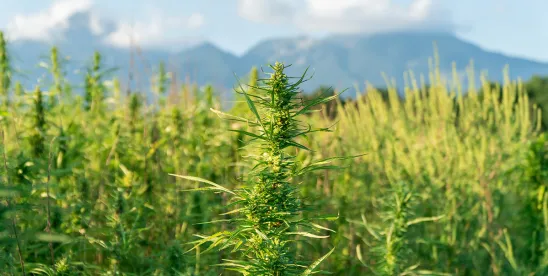On the heels of the enactment of New Jersey’s new hemp law (L. 2024, c. 73; Senate Bill No. 3235) (the “Intoxicating Hemp Bill”) amending the definition of “legal” hemp and limiting the production and sale of “intoxicating” hemp products to in-state licensed cannabis businesses and permitted liquor stores, impacted hemp producers, distributors, and stakeholders filed suit in federal court challenging the new law based on federal preemption, dormant commerce clause, and vagueness.
Foreshadowing the confusion and legal challenges that ensued, Governor Murphy highlighted several problems with the hemp bill in his signing statement:
- Lack of Resources: The bill mandates the Cannabis Regulatory Commission to regulate intoxicating hemp beverage sales by alcohol licensees without providing the necessary resources for enforcement.
- Uneven Regulatory Standards: Alcohol licensees selling intoxicating hemp beverages are not held to the same regulatory standards as cannabis businesses, creating an uneven playing field and potential public safety concerns.
- Legal Ambiguities: The insertion of the phrase “in this State” created confusion over whether out-of-state products could be exempt from the law’s restrictions or whether only in-state products are regulated, which could lead to potential violations of the Dormant Commerce Clause.
To understand the implications of the Intoxicating Hemp Bill, we need to start with the 2018 Farm Bill and the legal landscape of intoxicating hemp derivatives.
Federal Hemp Law
The Agriculture Improvement Act of 2018, commonly known as the 2018 Farm Bill, was a significant piece of federal legislation that legalized hemp nationwide. It removed hemp (defined as the cannabis sativa plant, including “all derivatives, extracts, cannabinoids, [and] isomers,” with less than 0.3% delta-9 [THC] concentration on a dry weight basis) from the list of controlled substances and distinguished it from marijuana, which remains illegal under federal law. The bill opened the door for the production, sale, and transportation of hemp and its derivatives (i.e. CBD) across state lines as long as products met the federal definition of hemp. Notable, the Farm Bill prohibited states from precluding “the transportation or shipment of hemp or hemp products,” see Notes to 7 U.S.C. § 1639o, but otherwise expressly permitted states to create laws that regulate the production of hemp more stringently, see 7 U.S.C. § 1639p(a)(3)(A). Most states, including New Jersey (until the amendment), adopted the federal definition of hemp.
As such, under state and federal law, certain hemp-derived products — those “with a delta-9 [THC] concentration of not more than three-tenths of one percent (0.3%) on a dry weight basis,” see 7 U.S.C. § 1639o(1) — do not come within the definition of an illegal controlled substance, and instead fall under the umbrella of a legal hemp-derived product.
Guiding Case Law
Courts have acknowledged the critical distinction that separates illegal marijuana and THC from legal hemp under both state and federal law is a product’s delta-9 THC concentration. See AK Futures LLC v. Boyd St. Distro, LLC, 35 F.4th 682, 690 (9th Cir. 2022) (observing that “the only statutory metric for distinguishing controlled marijuana from legal hemp [under the CSA] is the delta-9 THC concentration level”). In AK Futures, the Ninth Circuit determined that intoxicating delta-8[1] hemp products are legal under the 2019 Farm Bill provided the products comply with the THC limits (<.3% THC). Concurring with AK Futures, the Fourth Circuit recently re-affirmed the conclusion that hemp products containing intoxicating amounts of delta-8 or delta-10 THC are legal derivatives of hemp provided they contain no more than .3% delta-9 THC on a dry weight basis. See Tonya Anderson v. Diamondback Investment Group, LLC, 661 F. Supp. 3d 415 (4th Cir. 2024).
Faced with unfettered consumer access to intoxicating hemp products sold at gas stations, convenience stores, and liquor stores, various states have adopted laws and regulations aimed at prohibiting the manufacture and/or sale of such intoxicating hemp products. By changing the definition of legal “hemp” to exclude products containing more than trace amounts of intoxicating cannabinoids such as delta-8, delta-10, THCO, and others, states have faces legal challenges from hemp producers whose businesses were adversely affected by the new laws.
Many courts to have considered the issue, however, have found state regulations limiting the production and sale of intoxicating hemp products containing delta-8 and delta-10 are not preempted by the 2018 Farm Bill. See C.Y. Wholesale, Inc. v. Holcomb, 965 F.3d 541 (D. Haw. 2022); Hemp Quarters 605 LLC v. Noem, 2024 U.S. Dist. LEXIS 115011 (D.S.D. Jun. 29, 2024); see also N. Va. Hemp and Ag. LLC v. Virginia, 2023 U.S. Dist. LEXIS 195168, at * 24 (E.D. Va. Oct. 2023) (ruling that “with respect to the regulation of the production and sale of hemp products containing varying amounts of delta-8 THC or other THC variants manufactured and sold in Virginia, SB 903 is not in conflict with the Farm Act either through theories of impossibility of obstacle preemption.”). Indeed, the 2018 Farm Bill “says nothing about whether a state may prohibit possession or sale of industrial hemp.” Duke’s Inv, LLC v. Char, 2022 U.S. Dist. LEXIS 211778, at * 9 (Dist, Haw. Nov. 2022) (quoting C.Y. Wholesale. Inc. v. Holcomb, 965 F.3d 541, 546 (7th Cir. 2020)).
New Jersey Hemp Law
In 2019, New Jersey passed the New Jersey Hemp Farming Act, which mirrored the federal statute’s definition of hemp. On September 12, 2024, Governor Murphy signed into law the Intoxicating Hemp Bill, which attempts to regulate intoxicating hemp through a more stringent definition of “hemp,” a new category of products deemed “intoxicating hemp,” and by criminalizing the possession, production or sale of products containing tetrahydrocannabinols except those that meet the definition of “hemp” or are regulated as cannabis by the Cannabis Regulatory Commission:
- “Hemp” definition amended to include “total tetrahydrocannabinol concentration of not more than 0.3 percent on a dry weight basis” versus only delta-9 tetrahydrocannabinol concentration.
- “Hemp product” definition amended to be a finished product with “a total tetrahydrocannabinol concentration of not more than 0.3 percent on a dry weight basis and not more than 0.5 milligrams of total THC per serving and 2.5 milligrams of total THC per package.” Moreover, excluded from the definition of “Hemp product” is “a cannabinoid product that is not derived from naturally occurring biologically active chemical constituents” and “an intoxicating hemp product.”
- “Total THC,” a new term, is defined as “the total concentration of all tetrahydrocannabinols in hemp or a hemp product, including delta-8, delta-9, delta-10, tetrahydrocannabinolic acid and any other chemically similar compound, substance, derivative, or isomer of tetrahydrocannabinol, regardless of how derived or manufactured, and any other cannabinoid, other than cannabidiol [CBD].”
- “Intoxicating hemp product,” a new term, is defined as “any product cultivated, derived, or manufactured in this State from hemp regulated pursuant to the [2018 Farm Bill] or the New Jersey Hemp Farming Act … that is sold in this State that has a concentration of total THC greater than 0.5 milligrams per serving or 2.5 milligrams per package” but does not include “hemp products.”
- Making it unlawful for any person to sell or distribute any intoxicating hemp product unless the person is licensed by the Cannabis Regulatory Commission or is an approved liquor store or wholesaler.
- Making any intoxicating hemp products produced outside of New Jersey controlled dangerous substances thereby prohibiting their sale and distribution into the state.
The recent lawsuit challenges the validity and constitutionality of the new law arguing the Intoxicating Hemp Bill:
- Violates Federal Preemption: The lawsuit claims that New Jersey’s redefinition of hemp to include restrictions on delta-8 and other tetrahydrocannabinol isomers conflicts with the 2018 Farm Bill, which defines hemp based solely on delta-9 THC concentration.
- Infringes on Interstate Commerce: The plaintiffs also claim the law violates the Dormant Commerce Clause, as it discriminates against out-of-state hemp products, effectively barring the sale or transport of hemp products deemed “intoxicating” if they were manufactured outside New Jersey. The lawsuit contends the new law violates the dormant Commerce Clause because it favors in-state economic interests over those of anyone who cultivates, derives, manufactures, or sells federally legal intoxicating hemp products outside of New Jersey thereby substantially burdening interstate commerce.
- Is Impermissibly Vague: The lawsuit further argues that the new hemp law is unconstitutionally vague, making it difficult for businesses and individuals to understand the legal boundaries, especially concerning the limits of what constitutes legal and illegal products. The Intoxicating Hemp Bill appears to make it a criminal offense to possess hemp products produced or sold outside of New Jersey that exceed the Total THC level allowed by state law, but the exact contours of those prohibitions are unclear. The amendments appear to lead to an absurd result, criminalizing all hemp products that are “intoxicating” while they simultaneously purport to regulate these products by allowing the sale of “intoxicating” hemp products made in New Jersey by a licensed entity. Moreover, the new law imposes civil penalties for selling or distributing any intoxicating hemp products or hemp products that are not derived from “naturally occurring biologically active chemical constituents,” without defining same. For example, some forms of THC, such as delta-8 THC, occur naturally in the cannabis plant, but can also be converted from other “natural” cannabinoids such as CBD. For that reason, it would be unclear to the ordinary person whether delta-8 THC is a “naturally occurring biologically active chemical constituent.”
While it remains to be seen whether the District Court will grant a temporary injunction preventing the new hemp law from going into effect or whether it will find certain portions of the law to be unenforceable, there are already talks of a clean-up bill in Trenton. Federal policymakers have also taken note and recently introduced the Cannabinoid Safety and Regulation Act (CSRA) to establish national standards to protect public health and safety and keep cannabis products out of the hands of children. See www.wyden.senate.gov. The CSRA aims to implement a nationwide age restriction, ensuring that individuals under 21 cannot purchase hemp-derived cannabis products. Additionally, the legislation mandates rigorous safety testing for all hemp-derived products, requiring that they are manufactured using clean and safe processes. To enhance transparency, the CSRA emphasizes truth in labeling, while empowering the Food and Drug Administration (FDA) to recall or ban any products found to contain harmful chemicals or additives.
For now, the state of hemp affairs in New Jersey is in flux as stakeholders closely watch the lawsuit and look to lawmakers to provide clarity and guidance. Any hemp business or operators looking to enter the hemp space should consult with legal counsel. At Stark & Stark, we have vast experience with cannabis regulations and businesses and often counsel clients on how to navigate the complexities and nuances of federal and state laws affecting hemp manufacturing, licensing, production, sales, and distribution.\
[1] Delta-8 is a naturally occurring cannabinoid in both hemp and marijuana with similar intoxicating properties as delta-9 THC.



 />i
/>i

